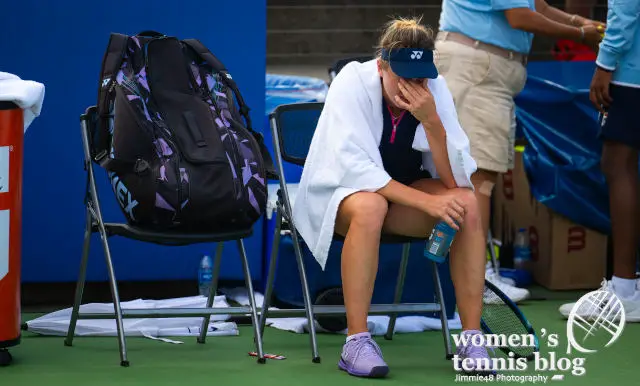Tennis can be a lonely sport. It’s a solo game where everything rides on you. Some players see this as an advantage – they can take full credit for their wins and losses. But there’s a flip side: players train alone, travel solo, encounter different obstacles and failures en route to future success. Coach Marcin Bieniek explains why players have so many chats with themselves and what is the right way to make the most out of your self-talk as an athlete.

Introduction
When you’re on the court, you’re on your own. Even if your folks cheer from the sidelines or your coach claps to pump you up, you’re the one dealing with all that pressure. You’ve got to stick to your game plan, react to your opponent’s shots, figure out what to do after every point, adjust to the ever-changing atmosphere, and handle those feelings that crop up during crunch moments. All these things make players want to share the load, but since there’s no one right there, players start talking to themselves.
But let’s get this straight – words are just words. They don’t have magic power over your body or your mind. Still, like everything else, if you don’t react right to what you say to yourself, your game can suffer. Players need to know that the words they use can boost their performance or make it tougher to keep up a good game. Learning how to talk and which words to use is super important. It helps players face challenges on and off the court and not mess up their chances of winning because they’re not talking right.
Tennis serves up plenty of obstacles. Some are inside your head, while others come from the outside. Hoping for an easy path to victory is just a dream. It’s smarter to work on stuff that’ll up your game. Does self-talk matter? Absolutely. Let’s dive into how it can change how you see things in your tennis journey.
1. The “You Suck!” Trap
Messing up is part of the deal. We categorize errors as unforced or forced, but in the end, they all mean that you did something improperly. A lot of tennis players slam themselves after a mistake. They call themselves dumb or announce they always mess up on certain shots when it’s tight. That kind of talk is a one-way ticket to self-doubt. Plus, it’s like giving your opponent a cheat sheet for their next moves. Don’t make it easy for them. Use words that help you learn from mistakes and step up your game.
2. The “It’s Not Fair!” Game
Winning isn’t about luck. It’s all about your skills and how you play. If your opponent nails two amazing shots in a row, it’s not luck – your shots set them up. If you draw a top-seeded player while your buddy gets an easier match, it’s not unfair. You don’t get to pick your opponents, but you can beat any of them. Keep your words in check and remind yourself that you’re in charge, not luck or what’s “fair.”
3. The “I Can’t Do This!” Mindset
To be the best, you’ve got to push past your comfort zone. When things get tough on the court or at the gym, that’s your chance to grow big time. When you struggle, you’ve got a choice – quit or fight against your discomfort. What you tell yourself matters here. Saying you can’t do something makes your body listen, and you end up holding yourself back. It’s way better to say you’ve got what it takes, that you’re ready for the challenge, and that you won’t give up until you crack it. Your brain needs the right pep talk, especially when things get really tough.
Conclusion
It doesn’t matter if you’re a loud self-talker or more of a quiet thinker. What matters is making your words your biggest supporter and your extra coach. You’ve got the power to decide how you handle challenges, and your words can nudge your thoughts, actions, and results. So, use them smartly – keep the good times rolling or spark changes when things aren’t going your way.
To learn more from coach Marcin Bieniek, join his on-demand video training program and get a 30% discount with the code WTBPROMO. Also, visit our Tennis Tips page to learn how to ace your game on clay courts, pick the right toss for your serve, improve your backhand, hit stop volley, reduce net errors, respond to drop shots, change bad habits in your tennis, and much more.







